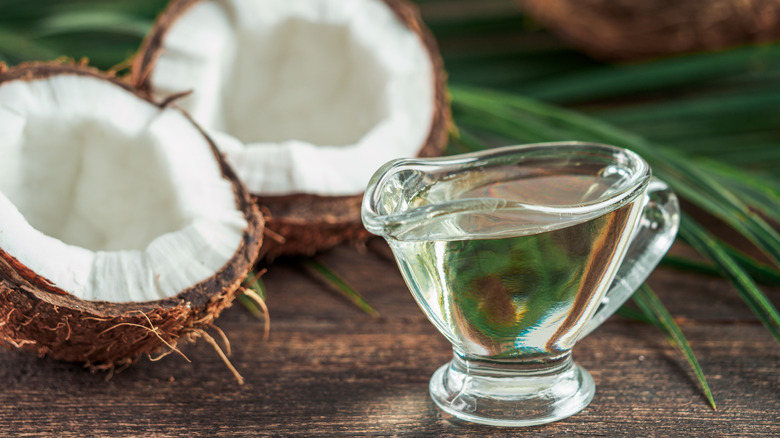What Really Happens When You Take MCT Oil Every Day
MCT stands for medium-chain triglyceride, a saturated fat supplement popular among athletes, weight lifters, and keto dieters. Medium-chain fatty acids are easier to digest than long-chain fatty acids. MCT oil is mainly extracted from coconut oil, but MCTs are also in palm oil and dairy foods. While saturated fats are usually associated with adverse health effects, MCT oil isn't unhealthy, according to Eat This Not That. MCT oil is broken down in your liver, where it then sends ketones into your bloodstream, giving you energy — one of the many health benefits of MCT oil.
According to U.S. News & World Report, MCT oil can help people with short bowel syndrome, pancreatitis, celiac disease, irritable bowel disorder, cystic fibrosis, and epilepsy. MCT oil is popular with the keto diet, which can help reduce seizures for people with epilepsy and other seizure disorders. People with these health problems often have problems absorbing fat properly. MCT oil can help since it's easy to digest and absorb. MCT oil is also more likely to be used as energy than be stored as fat, possibly helping with weight loss, but more research is needed.
MCT oil wasn't popular outside of these medical situations until Bulletproof Coffee debuted, which is sold as a coffee to be mixed with MCT oil and ghee, a clarified butter. Bulletproof claims MCT oil "supports weight management, burns fat, boosts brainpower and curbs cravings." Those are great selling points, but does it really work?
Health benefits of MCT oil
Who doesn't need more energy and weight management? Are you ready to add MCT oil to your daily routine? Let's look at the science first.
According to Healthline, MCT oil breaks down faster and turns into ketones for energy, where it's sent to your blood-brain barrier. That could explain why people claim to feel more energized and focused. A 2016 study looked at three different studies on ketones in the brains of healthy people and those with Alzheimer's. The ketones were the same, but those with Alzheimer's had less glucose. So the ketones from MCT oil could help memory, but more studies are needed.
Even if you don't have Alzheimer's, you could see benefits with energy and brainpower. Now, what about MCT oil helping with weight loss and management? A 2014 study showed that MCT oil can help boost two hormones that help you feel full longer — leptin and peptide YY, which can help reduce how much food you eat. In addition, your gut health plays a significant role in your overall health and weight management. A 2016 study published in Nutrients showed MCT oil can help balance your gut health by increasing good bacteria, which can help you lose weight.
MCT oil can contribute to a healthy gut microbiome and help you feel fuller longer, both of which can help you lose or maintain weight. In addition, the ketones from MCT oil can give you an energy boost and help you think clearer.
How to add MCT oil to your diet
Before you add MCT oil to your daily diet, consult your doctor. While it has some good benefits, it could have adverse effects if you are pregnant, breastfeeding, have diabetes, or any liver disease, according to USA Today. However, if you get the okay from your doctor, you can try it. Many people like to add it to their coffee in the morning for an extra boost of energy. You can also use it in your salads and smoothies.
WebMD recommends having no more than four to seven tablespoons per day spread out throughout the day. You're taking too much if you start to get stomach aches, diarrhea, cramps, gas, or bloating, or start vomiting. Start small with about one tablespoon added to your morning drink, whether it's coffee or tea or something else. Drink plenty of water first to rehydrate after sleeping.
Some risks with MCT oil are that it's high in calories and saturated fat, and could make you gain weight or raise your cholesterol. Consult a licensed dietitian to determine an excellent daily intake. Taking too much MCT oil can also lead to the build-up of fat in your liver. It can also stimulate hunger hormones, making you want to eat more. So it's crucial to figure out a good dose and not get too much.



